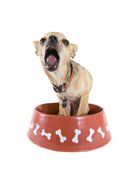 |
 | 
| |
Dog Training Guide for Long-Term ConfinementAre Nylon Dog Training Collars Save in Confined Areas?A dog training guide for long term confinement uses specific strategies. Destructive behavior has to be managed: e.g. dog training chewing. Use career dog in training as a model. Are nylon dog training collars safe in a confined space? A dog training guide for long term confinement focuses on keeping any elimination accidents that may happen confined to a certain area. It also focuses on managing destructive behaviors (such as chewing and biting) that can arise when a dog is confined for long periods of time. If you plan to be away for longer than 4 to 6 hours you need to have a long term confinement area for your pet. This area must be equipped with a designated elimination area. Good rooms for this are bathrooms, kitchens, laundry or utility rooms. Of course, the area should not have carpet on the floor. Line the space you set aside for elimination with newspapers or puppy pads (pads that are especially made to be urinated on). If you use a long term inside confinement area more than half the time you are away, your dog is likely to become confused about eliminating outside. They may start to prefer their long-term confinement area to eliminate in. It's always best to get a dog to eliminate outside, so encourage this as much as you can if possible. Dog Training Guide: Outside ConfinementIf you have to confine your dog in a long-term area too often or for longer periods of time, you may want to see if you can confine your dog in an outside kennel area. Do you have a space in your yard that you can securely fence off and that is big enough for your dog, a covered space, and an elimination area? If so, consider making that space your dog's long term confinement space. Note: One of the advantages with an outside kennel area is that your dog does not become confused about elminating inside. But you will need to train your dog for outside confinement (and inside confinement). Does your dog bark, whine or howl when left alone? If the answer is yes you need to work on that or you will have many complaints from your neighbors! Use Resources: Career Dog in Training CentersUse outside resources: talk to the owner of a career dog in training (a guide dog or a police dog owner). How do they handle long term confinements? How does they dog adjust to indoor and outdoor elimination? Learn from those who have career dogs or who train career dogs. Options to Long Term Confinement:If having your dog eliminate in the house - even in a designated area - bothers you, there are other options. Find a dog-sitter to take care of your pet while you are away for those long periods of time. A friend or relative or neighbor or a professional sitter that does this full time - a pet-sitter. This is especially helpful if you have a puppy that needs to go outside more often than every 4 hours. Or hire a professional dog walker (who is bonded) to come in to your home, pick up your dog, and take her or him for a long walk during the middle of the day. Another alternative is to find a local dog day care center and drop your dog off at the center on the way to work (or where ever you need to go for long periods of time). To properly train your dog to eliminate where you want it to, a professional dog training guide will advise that long term confinement only be used sparingly - otherwise your dog will be very confused. Return to top of Dog Training Guide. Return to top of Dog Training Tips. Return to The Dog Biscuit Home Page. | Related Articles
Dog Training Tips Basic Dog Obedience Training Equipment Crate Training a Dog Dog Biscuit Recipes Make the Best Rewards Doggy Training Dog Training Advice for Short Term Confinement Dog Training Devices Dog Training Guide for Long Term Confinement Dog Training Hand Signals Free Dog Clicker Training How to Train a Dog to Eliminate Outside? Teach Dog Tricks    | ||
|
Enjoy This Site?
Then why not use the button below, to add us to your favorite bookmarking service? | |||
|
| Home | About
| Contact | Sitemap
| What's New
|Privacy Policy |
This site is for informational purposes only. If you have an issue with your dog's health, please see your vet.
Website design by Webmidwife.com | |||
| | |||





